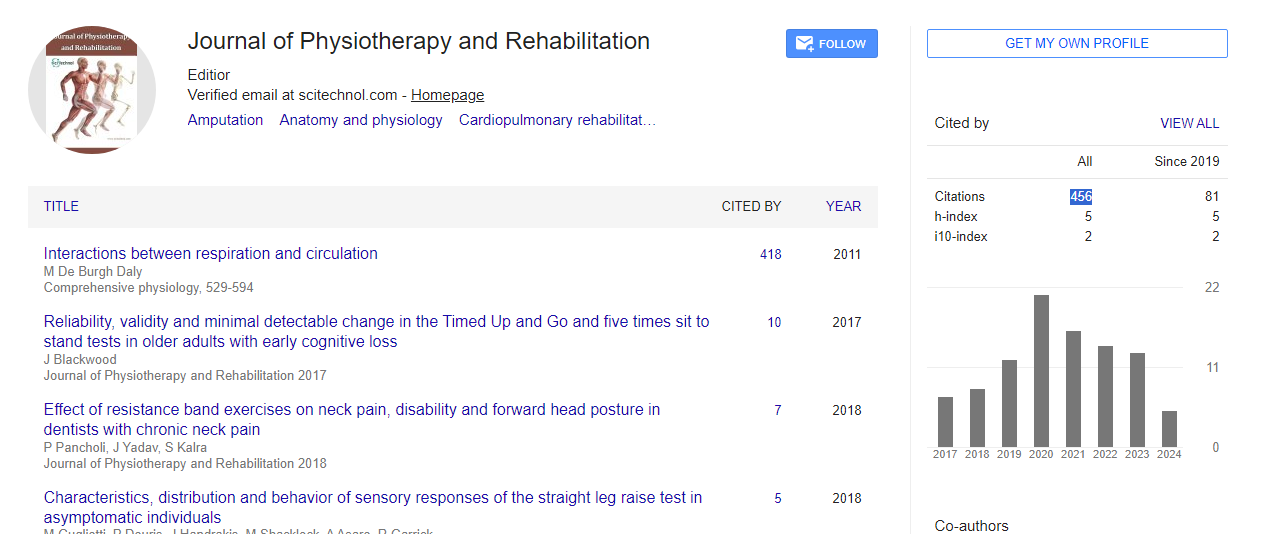Opinion Article, J Physiother Rehabi Vol: 8 Issue: 2
Role of Psychoneuroimmunology in Understanding Stress and Sickness
You Xi*
1Department of Psychology, University of Chinese Academy of Sciences, Beijing, China
*Corresponding Author: You Xi,
Department of Psychology, University of
Chinese Academy of Sciences, Beijing, China
E-mail: xi@you.cn
Received date: 27 March, 2024, Manuscript No. JPTR-24-135086
Editor assigned date: 29 March, 2024, PreQC No. JPTR-24-135086 (PQ);
Reviewed date: 12 April, 2024, QC No. JPTR-24-135086
Revised date: 19 April, 2024, Manuscript No. JPTR-24-135086 (R);
Published date: 29 April, 2024, DOI: 10.4172/JPTR.1000169
Citation: Xi Y (2024) Role of Psychoneuroimmunology in Understanding Stress and Sickness. J Physiother Rehab 8:2.
Description
In recent decades, the field of Psychoneuroimmunology (PNI) has gained significant attention for its exploration of the complex connections between the mind, the nervous system, and the immune system. One of the most compelling areas of research within PNI is the understanding of how stress influences immune function and contributes to the development and progression of illness. This article delves into the pathways explored by psychoneuroimmunology, shedding light on the mechanisms through which stress can lead to sickness.
Stress is a natural response to perceived threats or challenges, triggering a cascade of physiological and psychological reactions aimed at preparing the body to cope with the stressor. The primary mediator of the stress response is the Hypothalamic-Pituitary-Adrenal (HPA) axis, which regulates the secretion of stress hormones such as cortisol. In acute stress situations, the stress response is adaptive, mobilizing resources to deal with the immediate threat. However, chronic or prolonged stress can dysregulate the HPA axis and have detrimental effects on immune function.
PNI research has demonstrated that chronic stress can suppress immune function, making individuals more susceptible to infections, autoimmune disorders, and inflammatory conditions. Stress-induced alterations in immune responses include changes in the production and activity of immune cells, such as T cells, B cells, and Natural Killer (NK) cells, as well as dysregulation of cytokine signaling pathways. Chronic stress has been associated with increased inflammation, impaired wound healing, and a heightened risk of chronic diseases, including cardiovascular disease, diabetes, and autoimmune disorders.
Psychological factors, such as depression, anxiety, and perceived stress, play a significant role in modulating immune function and health outcomes. PNI research has revealed bidirectional relationships between psychological states and immune function, suggesting that mental health influences physical well-being and vice versa. For example, individuals with chronic psychological distress may exhibit dysregulated immune responses, characterized by elevated levels of pro-inflammatory cytokines and decreased immune surveillance.
The communication between the nervous system and the immune system is mediated by a complex network of neurotransmitters, hormones, and neuropeptides. Stress hormones, including cortisol and catecholamines, exert profound effects on immune cells and immune signaling pathways. Cortisol, for instance, has immunosuppressive properties and can inhibit the production of pro-inflammatory cytokines while promoting anti-inflammatory responses. Dysregulation of neuroendocrine signaling pathways under conditions of chronic stress can disrupt immune homeostasis and contribute to disease susceptibility.
In addition to physiological mechanisms, psychosocial and behavioral factors also influence the stress-immune relationship. Lifestyle behaviors such as sleep disturbances, poor diet, physical inactivity, and substance abuse can exacerbate the impact of stress on immune function and health outcomes. Conversely, adopting healthy coping strategies, engaging in relaxation techniques, social support, and mindfulness practices can reduce the detrimental effects of chronic stress on immunity.
Understanding the pathways linking stress to sickness has important implications for the development of interventions aimed at promoting flexibility and reducing the negative health consequences of stress. Psychoneuroimmunology research informs the design of mind-body interventions, such as Cognitive-Behavioral Therapy (CBT), Mindfulness-Based Stress Reduction (MBSR), and relaxation techniques, which have been shown to modulate immune function, reduce inflammation, and improve health outcomes. Integrative approaches that target both psychological and physiological aspects of stress management offer promising avenues for enhancing flexibility and care for well-being.
Conclusion
Advances in prosthetic technology are revolutionizing the field of rehabilitation, offering unprecedented opportunities for mobility, functionality, and independence for amputees. From bionic limbs that replicate natural movements to customized sockets that optimize comfort and fit, prosthetic devices continue to evolve at a rapid pace. By apply the power of innovative materials, electronics, and connectivity, prosthetic technology is not only enhancing mobility but also transforming the lives of individuals with limb loss, empowering them to live life to the fullest.
 Spanish
Spanish  Chinese
Chinese  Russian
Russian  German
German  French
French  Japanese
Japanese  Portuguese
Portuguese  Hindi
Hindi 